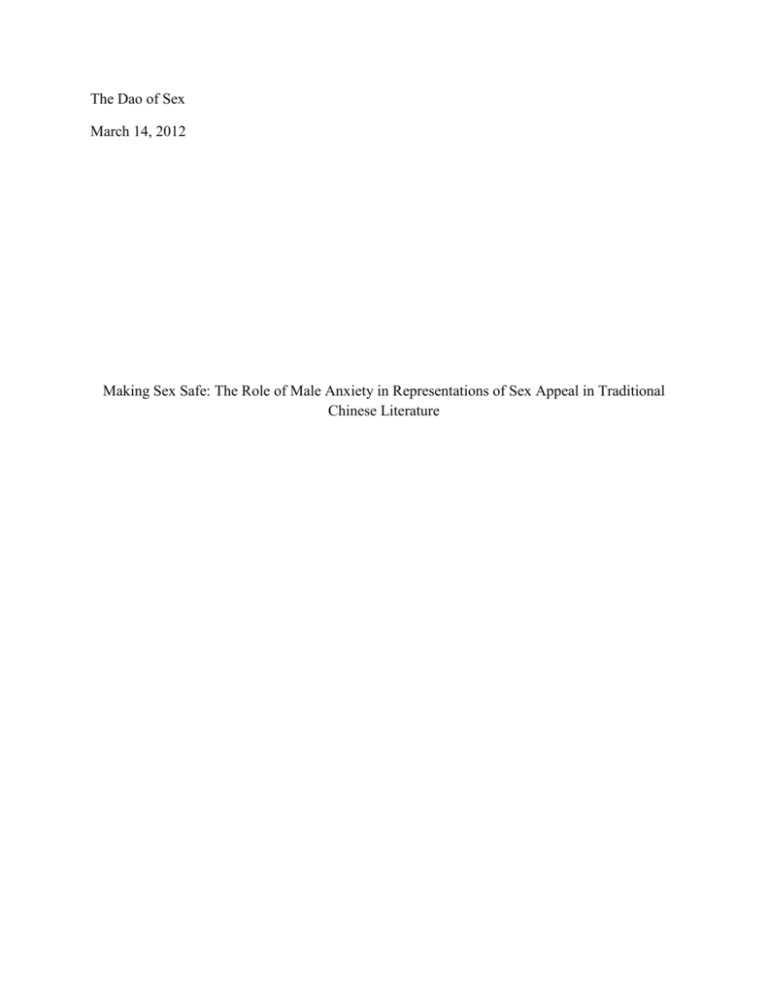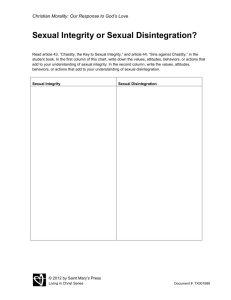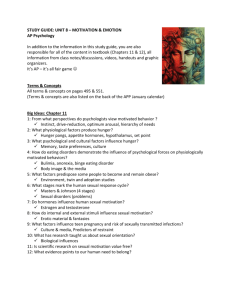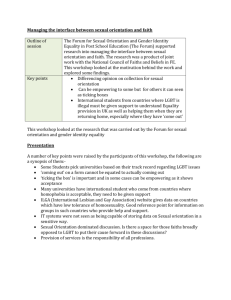
The Dao of Sex
March 14, 2012
Making Sex Safe: The Role of Male Anxiety in Representations of Sex Appeal in Traditional
Chinese Literature
Li Yu’s protagonist in The Carnal Prayer Mat, the young scholar Vesperus, is an
archetypal representation of the desiring subject in traditional Chinese fiction. Being a man of
good social standing, a capable student, and unrivaled in his good-looks, Vesperus enjoys a
position of power within traditional Chinese society by virtue of his age, class, and gender. The
man in a privileged position can, because of the power vested in him by society’s patriarchal
hierarchy, choose for himself one or several sexual partners. Sexual relationships between the
normative male desirer and any of his sexual partners is coded and accepted by society, provided
that the relationship does not violate or in some way compromise the established social order. In
the context of traditional Chinese culture, the normative social and cultural order was a nexus of
Confucian virtue or morality and Daoist philosophy. Under this framework then, safe sex is sex
that can be inscribed within the prevailing cultural mores of traditional China and does not
threaten the hegemonic values of a male-dominated society. Normative representations of sex
appeal and what is sexy conform to these same standards, and encourage the male desirer to be
titillated by women who are safe to have sex with. A common trope of a desirable female body
in traditional Chinese fiction is that she is passive, dainty, and delicate. Such a fragile female
partner poses no threat to patriarchy because she is dominated by the man during sex just like she
is dominated by the man in society at large. Although the role of the submissive female sexual
partner in the maintenance of patriarchy should not be understated, this paper challenges a mere
surface level reading of the passive female in search of an embedded male anxiety about female
sexual potency as well as the importance of sexual cultivation for the lengthening and sustaining
of human life. In so far as the act of coition was represented as a ‘battle of the sexes,’ a desirable
opponent in battle was one who was easily conquered and possessed rich spoils.
In The Art of the Bedchamber, Douglas Wile prefaces the text of the Ho Yin Yang and Su
Nu Ching with the statement that “sexual beliefs and practices outlined in the texts in the
collection express an ethos shaped by other elements in the culture… but they also contributed to
these elements.”1 Wile’s sentiment is valuable for the treatment of the relationship between
sexual desire and society, in that it shows how ideas about sexual cultivation were
simultaneously models of and models for an ideal woman in traditional Chinese society. The
idea that, for a man, there is a ‘right’ kind of woman to engage in sex with follows logically from
the culture that produced sex manuals that showed the ‘right way’ to have sex. Because sexual
relations were integrated into the framework of therapeutic arts of physical cultivation in
traditional China, the “nurturing life” tradition held that sex the right way would result in
physical well-being.2 Sex the wrong way, however, could result in disease, bodily dysfunction,
and even death if the vital substances ch’i (vapor) and ching (essence) were not circulated and
absorbed properly.3 Provided that ‘correct’ sexual practice, according to the Daoist manuals, was
a matter of life and death, what or who is an object of sexual desire becomes infused with a
pragmatism based on the necessity for successful coition.
Since they are written by men and for a male audience, ‘success’ in the context of the
Daoist sex manuals is achieved by the nourishing of the male yang essence by the female yin
essence. The sexual act itself, however, is not sufficient to guarantee that the nurturing of the
male partner is accomplished, thus sex “had to be carefully controlled so that the couple at no
point committed a tactical error that would lead to failure.”4 For this reason, manuals had to
1
Wile, Douglas. Art of the Bedchamber: The Chinese Sexual Yoga Classics including Women's Solo Meditation Texts.
Albany: State University of New York, 1992. Pp 5
2
Harper, Donald. "The Sexual Arts of Ancient China as Described in a Manuscript of the Second Century B.C."
Harvard Journal of Asiatic Studies 47.2 (1987). Pp 540
3
Ibid 548
4
Ibid 581
exist to prescribe the right sequence and order to the sexual union to achieve the desired result.
Although correct sexual practice was a potent tool for extending life, this sometimes came at the
expense of one of the sexual partners whose vital essence was depleted in order to strengthen the
other. For this reason, absorption of your partner’s vital essence for the sake of nourishing your
own supply did not come without a price and the sex act was called the ‘battle of the stealing and
strengthening.’5 For a male, increasing one’s own treasury at the expense of the partner or enemy
was the only way to guarantee health and extend life, for as the Ho Yin Yang notes, “sucking her
ching spirit upward, one can live forever and be coeval with heaven and earth.”6
Whereas the male body was vulnerable to depletion of vital essence during sex and thus
needed to suck up the female’s ching spirit in order to sustain his life, the female body was
endowed with a much more robust (and perhaps inexhaustible) supply of vital essence which
gave her a distinct advantage in the bedroom. Woman is, by her very nature, dangerous to man
in the bedroom if he is unprepared and unskilled in the ‘combat’ arts of the bedchamber. In the
cultural milieu of traditional Chinese society at large, men have a power advantage over women.
The reversal of the prevailing gendered dynamics of power that occurs within the inner-quarters,
where female sexual potency provides them with an inherent advantage over men in sexual
practice, was a major source of anxiety for sexually active men. The tradition displays evidence
of this anxiety through the way in which “the techniques described in these texts make it possible
for the male to surmount his inherent handicap in the bedroom, to triumph over woman, who not
only has holds the power to bring forth life, but walks away so little diminished.”7 In a
discussion of sexual body techniques within the Mawangdui medical corpus, Rudolf Pfister
Basel states that “male neediness and female (sexual) potency form together some kind of
5
Douglas Wile, Art of the Bedchamber, 14.
Ibid 17
7
Ibid 15
6
unmentionable region within this discourse,” but in fact, this ‘unmentionable region’ manifests
itself into (and is indeed visible in) the construction of what an ideal, attractive, sexually
appealing partner looks like in traditional Chinese literary sources.8
In the Su Nu Ching, or the Classic of Su Nu, The Yellow Emperor describes an ideal
sexual female partner as possessing the following characteristics: by nature gentle and soft
spoken, having a ‘bore hole’ that is elevated and private parts free of hair, emitting copious ching
secretions, and never having born children.9 The Yellow Emperor’s comments are indicative of
the high esteem placed on women whose vital essence was at its peak and could be most easily
extracted by the male partner, guaranteeing his success in ‘battle.’ Similarly, her elevated bore
hole and hair-free vulva provide easy access, a necessary component of female sexiness that
increases the naturally disadvantaged male’s ease of conquering his adversary and performing
well. The soft-spoken nature and gentleness that the Yellow Emperor ascribes to an ideal female
partner in sex reflects not only a prevailing Confucian societal hegemony of patriarchy, but also
reveals the extent to which in the bedroom, the woman had a leg-up (no pun intended) in the
battle. Women, to be desirable, must not only have abundant essence which can be absorbed
through coition; they must also be passive lovers who will not put up too much of a fight in the
battle of stealing and strengthening.
The sexual desire of Li Yu’s famous protagonist Vesperus reflects notions of female sex
appeal that show continuity with the traditional Daoist sex manuals. In his lexicon of beautiful
women, perhaps the first iteration of the ‘little black book’ motif, Vesperus chronicles the
appealing qualities of the females he encounters in order to plan his forthcoming trysts. In terms
8
Basil, Rudolf Pfister. "The Production of Special Mental States Within the Framework of Sexual Body Techniques -As Seen in the Mawangundui Medical Corpus." Love, Hatred, And Other Passions. Ed. Poalo Santangelo and
Donatella Guida. Boston: Leiden, 2006. Pp 181
9
Douglas Wile, Art of the Bedchamber, 93.
of embodied characteristics of female sexuality, the discourse of the Carnal Prayer Mat
highlights the vulva as the focal point of male desire. During Jades Scent’s seduction of
Vesperus under his voyeuristic gaze, “lest the most important part of all be half hidden
underwater, she lay back and spread her legs, giving him a full frontal view.”10 The text
explicitly refers to her genitals as ‘the most important part’ and it also implies that this is the
most powerful force that drives Vesperus’ erotic desire because at the very moment he sees
between Jade Scent’s legs, he is uncontrollable and, at last, enters the chamber. The penetration
of Vesperus’ gaze between the legs serves as a metaphor of (and even foreshadows) his literal
penetration during the sexual act, and thus ignites his passion furiously. The character of The
Knave, who plays the role of the connoisseur and whose gaze penetrates deeper than that of
Vesperus, has intimate knowledge of “such beautiful women with such well-developed vulvas,”
which entitles him to aid Vesperus’ quest for successful adultery.11 Similarly, in another popular
representation created by Li Yu, “A Male Menciu's Mother Raises Her Son Properly by Moving
House Three Times,” the main character Xu Wei declares that women’s breasts are ‘superfluous
appendages.’12 Li Yu’s fiction seems to diminish other physical markers of femininity in sexual
attraction and highlights the vulva or vagina as the ultimate object of sexual desire. In the
context of traditional Daoist notions of sexual cultivation, it is the vagina itself that is the conduit
of vital essence exchanged between men and women during sexual intercourse. Therefore,
despite the man’s concern for outward beauty, it is ultimately the sexual organ of the woman that
will determine the result of their sexual encounter and finally the man’s well-being. In order to
10
Li, Yu. The Carnal Prayer Mat. Trans. Patrick Hanan. Honolulu: University of Hawaii, 1990. Pp 210
Ibid 69
12
Li, Yu. "A Male Menciu's Mother Raises Her Son Properly by Moving House Three Times." Silent Operas
(Wusheng Xi). Trans. Patrick Hanan. Chinese University of Hong Kong, 1990. 99-134.
11
succeed at sex, the man is predisposed to be attracted to the vulva because it is the immanent
source of a potent alchemical elixir; vaginal secretion.
Scholar Vesperus’ desire in The Carnal Prayer Mat is also driven by the relatively young
age of his paramours. This reflects a well-established Daoist ideal that can be labeled the ‘cult of
the youth,’ but more broadly follows the idea that younger people have leaked or spent less vital
essence, and therefore have fuller stores to be plundered in sexual union of yin and yang.
Vesperus names Black Belle as particularly remarkable because of the detail that at the sexually
mature age of thirty-five, she looks like she is only fifteen. Her beauty is derived from her
youthful appearance; “her waist may be thicker than a young woman’s, but the line of her
eyebrows is arched as any brides… her cheeks are as rosy as ever maintaining their flower-like
original brightness.”13 Vesperus is attracted to her physical body to be sure, but instead of being
interested in her physical form as such he is instinctively drawn to those markers of youth which
Black Beauty possesses. Her youthful appearance is both derived from and serves as evidence of
the abundance of chi. Additionally, the narrator’s voice pronounces that “for the five or six years
following the age of thirteen, all girls, good looking or not, have a certain bloom in their cheeks
that men find subtly appealing.”14 This passage is striking because of the way it negates other
aesthetic qualities of beauty (‘good looking or not’) and places the abundance of chi, in this case
marked by youth and embodied as ‘a certain bloom,’ at the pinnacle of female desirability and
sex appeal. The male desirer is driven by an uncertainty of his sexual proficiency and the burden
of a vulnerable, declining male essence so he is attracted to women who possess markers of an
abundance of chi that is his for the taking.
13
14
Li Yu, The Carnal Prayer Mat, 85.
Ibid 77.
Both Jade Scent and Pale Rose Maid attract Vesperus because he perceives them as
docile, passive partners, ergo easy targets for sexual warfare. Pale Rose Maid is described as
having “sexual desires as yet undeveloped” and “walking with delicate steps, moving as lightly
as a swallow is able to fly,” which marks her as approachable and conquerable for the lascivious
student.15 It is assumed that a woman’s light and delicate appearance outside her home is
matched by a similarly yielding personality in the bedroom. Vesperus’ passion is similarly
enflamed by Jade Scent’s beauty because she is easy to caress, “soft as though flesh alone,” and
“in fact…put up no resistance, but let him loosen her golden bracelets, undo her silk sash, and
strip off all her clothes.”16 Despite the man’s lingering sexual disadvantage, he can guarantee
victory if a lady’s conduct in society is matched by her behavior in the inner quarters of the
bedchamber.
Vesperus also marks the young girls as being sexually undeveloped, at least in terms of
their sexual desire. Although arousal is integral to the secretion of vaginal fluid, the sexual
desire of the female apparently does not need to be developed. At face value the absence of
female desire from the intimacy equation is problematic but in fact, it fits the framework of the
traditional understanding of the uniformity of sexual response elicited from sex. In other words,
although the female’s own desires may be uncultivated or docile, this will not prevent her from
experiencing pleasure and secreting vital essence. The male desire, then, is not contingent on the
female’s reciprocation of his arousal because pleasure is the inevitable outcome of sex. The
young, naïve female who is too innocent to hold her own desires is, then, a perfect candidate for
sexual union with the savvier, more experienced male subject. He can still elicit a powerful
sexual response from the female body during intercourse, thus replenishing himself with vital
15
16
Li Yu, The Carnal Prayer Mat, 83.
Ibid 40-41, 51.
fluid, and yet his own essence is not coveted. Union with a younger, passive, inexperienced
lover is desirable because it is a more even playing field, and thus a safer endeavor to undertake.
Women’s best efforts to make themselves beautiful with makeup and other modifications
of their appearance are futile. The discerning male eye is weary of this trick, and unappreciative.
Vesperus voices the complaint that “[he’s] been to many cities and towns, but all the women I’ve
seen have been larded with makeup to hide their dark complexions…I’ve not met a natural
beauty.”17 Similarly, Xu Wei complains that women’s objectionable features include hiding the
truth with powder and rouge and employing artifice by binding their feet and piercing their ears.
For Xu Wei, his displeasure with the unnatural appearance of all women is enough to turn him
toward a preference for “the Southern Mode,” and declare that “there’s absolutely no artifice
about [a pretty boy]; he’s natural from head to toe.”18 More than a criticism of the unnatural, this
trope within the literature is a response to a fear of the unknown or uncertain. What makeup and
artifice represent in the context of the stories is yet another advantage woman can gain over man;
that of deception. Outward physical markers are most readily observable to the male gaze, and
he thus relies on them to accurately select a female partner to engage in sexual intercourse.
Because of the consequences of ‘bad’ sex and the danger of spending one’s essence, selection of
the partner is crucial to success. If a woman can hide her appearance, she can in effect trick the
man into a disadvantageous union which is potentially harmful. The man’s inability to conceal
his own sexual power, because it is embodied in the width and length of his penis which is
ultimately revealed during sex and (except in rare cases of surgery, etc.) unalterable, also
contributes to this anxiety about the ‘covering up’ of appearances. A truly beautiful woman,
then, is one who is naturally and more importantly easily recognized as such, because of the
17
18
Li Yu, The Carnal Prayer Mat, 67.
Li Yu, A Male Mencius’s Mother, 103.
comfort the male desirer gains from seeing her ‘true’ form and making an informed decision
about his sex life.
Explorations of the desirable female within traditional Chinese literary culture remain
incomplete without the alternative perspective represented. In other words, examining the
undesirable and the unattractive can also shed light on the kind of inherent qualities that men
would value in a female lover. Perhaps one the most complex female figures that emerges from
the sources is the character Empress Wu in The Fountainhead of Chinese Erotica: The Lord of
Perfect Satisfaction (Ruyijun zhuan). Empress Wu is introduced as a negative character, whose
inwardly lascivious nature is matched only by her outward ruthlessness. Also, she is a slanderer,
and a false accuser of disloyalty who abuses power and those that serve her. The Empress is
marked as sexually dangerous because, as a woman, she gives “free reign to her desires and
indulged in lechery.”19 Empress Wu embodies the greatest fears of the desiring male subject in
the traditional Chinese context; she is sexually potent, experiences, desirous, and violent.
To make matters worse, she kills her sexual partners when she is done with them, either
directly through sex by exhausting their vital essence and life energy, as is the case with Nanqiu
whose bone marrow depletes, or by other means like when she has Huaiyi bludgeoned to death.20
Ironically, Empress Wu is exceptionally beautiful and even looks exquisitely young for her age
because of her sexual cultivation. Although she is beautiful, she remains undesirable in the eye
of the reader, because of the way her personality is constructed. She is also impossible to satisfy,
except in the case of the Lord of Perfect Satisfaction, who possesses a legendarily sized member,
and can thus overpower her feminine hypersexuality. Empress Wu’s character is a warning
against the danger of the over-sexed, potent female and reminds men of their disadvantage in the
19
Stone, Charles R. The Fountainhead of Chinese Erotica: The Lord of Perfect Satisfaction (Ruyijun Zhuan).
Honolulu: University of Hawai'i, 2003. Pp 138.
20
Ibid 139, 140
bedroom. Furthermore, she serves as a good example of how beauty is only skin deep, and is not
necessarily desirable unless accompanied by the right kinds of inner qualities.
At the end of his narrative in The Carnal Prayer Mat, Li Yu- who claims to ‘mock
everything’ through his text- pokes fun at the way traditional representations of women,
including his own, have constructed their sex appeal and beauty. He does this by drawing a
distinction between “good-looking women” and women with “practical usefulness.”21 Practical
usefulness in this case, of course, means good for sex and good-looking means prevailing tastes
for the outward appearance of women. He problematizes the relationship between the two
attributes by presenting them as a dichotomy, stating outright that “good looks and practical
usefulness are mutually exclusive.”22 The attributes of a good looking woman are that she is thin,
short, and weak while a woman of practical use is fat, tall, and robust. Certainly Li Yu must
have his own text in mind in this satirical moment, because Vesperus’ sexual conquest has been
made up entirely of women who would, according to this framework, be beautiful but useless at
sex.
In addition to making a distinction between sex appeal and beauty (which we have seen
elsewhere) Li Yu is useful because he reminds the reader that the representations of the desired
female subject are in fact merely that; representations. Li Yu seems to be directly addressing the
tension between what men fantasize about and hope for in their idealized sexual partners and
what women are actually like in all of their complexity and imperfection. Rudolf Pfister Basil
comments that sexual cultivation texts the deal with a body, but “by body I mean here the
integrated view on the human body, male or female, mostly in lived experience… thereby
21
22
Li Yu, The Carnal Prayer Mat, 253-254.
Ibid 254
including mental states.”23 Sexual attraction and powerful desires function best at the
intersection of what the mind wants and what the body needs. These two components of what
constitutes a sexy, desirable female body are not always in agreement with each other, as Li Yu
cleverly points out. However, says Li Yu, because “sexual enjoyment is entirely dependent on
your peace of mind; it cannot survive if you feel nervous” sex appeal in traditional Chinese
Literature is rooted in attracting the male gaze to a partner that is ‘safe’, i.e. one that him feel
secure during the sexual performance which is, by all accounts, an anxiety-producing act.
23
Basel, Rudolf Pfister. "The Production of Special Mental States Within the Framework of Sexual Body Techniques,
180.
Works Cited
Basel, Rudolf Pfister. "The Production of Special Mental States Within the Framework of Sexual
Body Techniques -- As Seen in the Mawangundui Medical Corpus." Love, Hatred, And
Other Passions. Ed. Poalo Santangelo and Donatella Guida. Boston: Leiden, 2006. Print.
Harper, Donald. "The Sexual Arts of Ancient China as Described in a Manuscript of the Second
Century B.C." Harvard Journal of Asiatic Studies 47.2 (1987): 539-93. JSTOR. Web.
Li, Yu. "A Male Menciu's Mother Raises Her Son Properly by Moving House Three Times." Silent
Operas (Wusheng Xi). Trans. Patrick Hanan. Chinese University of Hong Kong, 1990. 99134. Print.
Li, Yu. The Carnal Prayer Mat. Trans. Patrick Hanan. Honolulu: University of Hawaii, 1990. Print.
Stone, Charles R. The Fountainhead of Chinese Erotica: The Lord of Perfect Satisfaction (Ruyijun
Zhuan). Honolulu: University of Hawai'i, 2003. Print.
Van Gulik, R.H. Erotic Colour Prints of the Ming Period. Boston: Leiden, 2004. Print.
Wile, Douglas. Art of the Bedchamber: The Chinese Sexual Yoga Classics including Women's Solo
Meditation Texts. Albany: State University of New York, 1992. Print.








